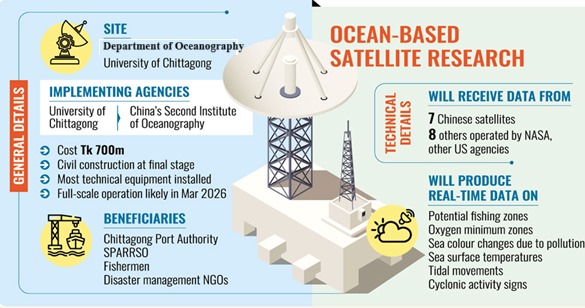Push to harness blue economy
Trial operation of ocean satellite ground station to begin in Dec

Published :
Updated :

Bangladesh is set to inaugurate its first-ever ocean satellite ground station in Chattogram by the end of this year, marking a significant milestone in the country's push to harness the blue economy.
The facility - located at the University of Chittagong's Department of Oceanography under Faculty of Marine Sciences and Fisheries - is expected to begin trial operations as early as December, according to officials involved in the project.
Chief Adviser Dr Muhammad Yunus is expected to visit the site on May 14 during a convocation ceremony at the university.
Until now, Bangladesh has relied on foreign sources for oceanographic data, often at the cost of precious foreign currency. The establishment of this ground station is poised to end that dependence.
"This is a unique and pioneering project in Bangladesh. We hope to begin test operations by the end of the year," said Dr Mohammad Muslem Uddin, the project's coordinator, in an interview with The Financial Express in Dhaka on Tuesday.
He said full-scale operations could commence by March 2026, should the trial proceed as planned.
The project, jointly undertaken by the University of Chittagong and China's Second Institute of Oceanography, is estimated to cost Tk 700 million.
A memorandum of understanding was signed in 2019, but implementation was delayed due to the Covid-19 pandemic.
Once operational, the station will receive data from seven Chinese satellites and another eight operated by the National Aeronautics and Space Administration (NASA) and other US agencies.
According to project officials, the station will produce a range of oceanographic products, including chlorophyll concentration, suspended sediment levels, Secchi disk depth, visible spectroscopy data, optical depth, downwelling irradiance, and the Normalised Difference Vegetation Index (NDVI).
While some of these terms are technical, the practical output will include real-time data on potential fishing zones, oxygen minimum zones, changes in sea colour due to pollution, sea surface temperatures, tidal movements, and signs of cyclonic activity.
This data will be crucial for maritime navigation, fisheries management, disaster preparedness, and ocean research.
Key stakeholders, such as Chittagong Port Authority (CPA), Bangladesh Space Research and Remote Sensing Organisation (SPARRSO), fishermen, and disaster management non-governmental organisations (NGOs), are expected to benefit directly from the project.
"We strongly believe the satellite station will play a pivotal role in advancing the blue economy agenda," said Dr Muslem.
To ensure the project's long-term financial sustainability, the University of Chittagong plans to introduce a subscription-based model for stakeholders like shipping companies, fishery operators, coastal management authorities, and emergency response organisations.
A mobile application planned by university students is expected to deliver real-time alerts for fishing zones and early warnings for cyclones and tidal surges.
"The goal is to make this data accessible and actionable for users by subscription and researchers," said Dr Muslem in a dormitory in Dhaka, owned by the University of Chittagong.
By enabling the country to receive and process ocean satellite data locally, the station will improve early warning systems and disaster response times, particularly during cyclones and coastal floods.
Civil construction at the Department of Oceanography is now at the final stage, with most of the technical equipment already installed.
Officials are confident that the ground station will be ready for full-scale test runs by December, ushering in a new era of ocean-based satellite research in Bangladesh.
"This is not just a scientific facility," Dr Muslem emphasised. "It is a strategic asset for national development."
jasimharoon@yahoo.com


 For all latest news, follow The Financial Express Google News channel.
For all latest news, follow The Financial Express Google News channel.